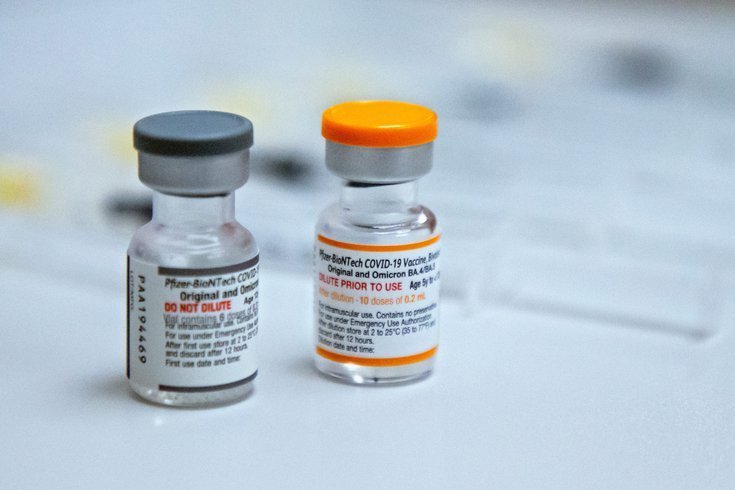
August 21, 2024
 CHRIS LANDSBERGER/THE OKLAHOMAN; USA TODAY NETWORK
CHRIS LANDSBERGER/THE OKLAHOMAN; USA TODAY NETWORK
The FDA is expected to approve new COVID-19 vaccines shortly. Coronavirus infections and hospitalizations have risen in Philadelphia, but COVID-related deaths have not.
UPDATE 8/22/24: The Food and Drug Administration approved two new COVID-19 vaccines on Thursday that are tailored to target variants of the virus currently circulating. The vaccines, manufactured by Moderna and Pfizer, will help protect against serious health consequences of COVID, including hospitalization and death, officials said.
"Given waning immunity of the population from previous exposure to the virus and from prior vaccination, we strongly encourage those who are eligible to consider receiving an updated COVID-19 vaccine to provide better protection against currently circulating variants," said Dr. Peter Marks, director of the FDA's Center for Biologics Evaluation and Research.
Continue reading below for the original article published Aug. 21, 20224.
With COVID-19 cases spiking in the Philadelphia region and across the United States, the Food and Drug Administration is poised to approve updated vaccines – possibly by the end of the week.
Once the FDA gives Pfizer-BioNTech and Moderna the green light for the vaccines, the shots should be available within days, according to national media reports. They are coming as COVID infection rates are growing in at least 25 states, including Pennsylvania, the most recent data from the Centers for Disease Control and Prevention shows. The infection rate in New Jersey appears to have plateaued.
Philadelphia has seen an uptick in positive COVID tests, emergency department visits where people test positive and COVID-related hospitalizations. But these rates are still "extremely low" compared to where they were at the height of the pandemic, and there has not been an increase in COVID-related deaths, according to the Philadelphia Department of Public Health.
Nationwide, COVID-related hospitalizations and deaths remain low despite the upsurge in infections, according to the CDC.
"We are seeing more cases, but the majority of these patients are able to stay home, take care of themselves and get better," said Dr. Eric Sachinwalla, Jefferson Health's medical director of infection prevention and control.
Still, people should get vaccinated when the shots are here, with a couple of exceptions, Sachinwalla said. People who have recently had COVID should wait at least four months to get the new vaccine, and people who had booster shots in the spring should wait six months.
"Your immune system needs time to react to the next vaccine," Sachinwalla said. "If you get vaccines too quickly, your immune system is like, 'I just saw this. I don't need to worry about it,' so it doesn't respond appropriately.'"
The new vaccines are targeting the KP.2 variant, one of several circulating in the United States, the Infectious Diseases Society of America reports. But even if the vaccines set to hit the market don't exactly match up with the most prevalent variants of the virus, the shots still will offer strong protection, Sachinwalla said.
"Consistently, we've found that the vaccine is very good at protecting people against getting really sick," Sachinwalla said. "You might still get sick … but we've been able to convert COVID from something that was landing people in the ICU on a ventilator.
"'Some people will say I had COVID and I did fine, so why do I need to get the vaccine?'" Sachinwalla added. "And yes, you did fine that time. It might not be the same case next time."
Getting vaccinated significantly decreases hospitalizations and deaths related to COVID, and some data suggests that it protects against long COVID, Fishman said. Long COVID is a serious illness that can last for months, or even years after the original infection.
Getting vaccinated "is not as accepted as I think it should be, and I think that is generally politically related," Fishman said.
Another reason why COVID may be spiking this summer is because "there's just a general acceptance of COVID now," said Dr. Neil Fishman, chief medical officer of the Hospital of the University of Pennsylvania. "(People) don't stay home when they're sick, and they go out and transmit it to others."
He also attributed the surge to COVID's ability to mutate and evade immune responses, and to summer being particularly hot this year. Excessive heat keeps people indoors, increasing the transmission of the disease, Fishman said.
Public health departments have trouble tracking infection rates through testing, because more people are using at-home tests and fewer people are being tested for infections in health care settings. Now, health departments trace infection levels through wastewater.
"COVID is excreted in stool, so (public health officials) can survey wastewater and get a very good idea of what is circulating in the community," Fishman said.
To prevent infection and limit the spread of COVID, people are advised to get vaccinated, wash their hands frequently, cover their mouths when coughing and stay home if they are sick. Wearing a mask is advisable for older adults, people who have underlying diseases and anyone in enclosed spaces when there is a high level of disease activity – such as right now, Fishman said.
But "there's no need to wear a mask when you're out in the open and walking around," Fishman said. "And I think it's even relatively safe in an open environment, like a grocery store, for instance, where there are very high ceilings, a lot of space, not a lot of crowding."
When flying, people should mask if they are sitting next to someone who is coughing or sneezing. Airplanes generally have good air circulation, except during takeoff and landing, when the system shuts down, so Fishman also recommended masking during those times.